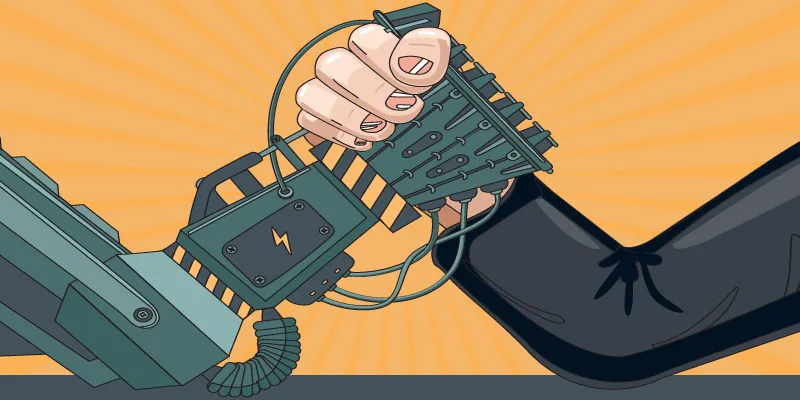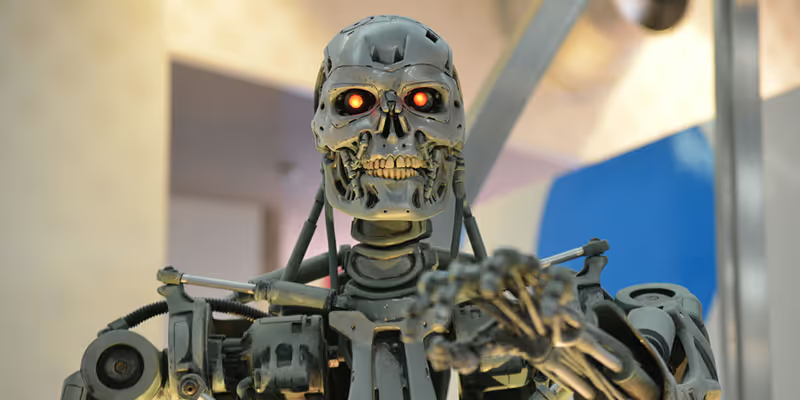Artificial Intelligence versus humans, who will win?
Artificial Intelligence is a computer program of a higher order and nothing else.
When I saw men fighting off a sinister takeover attempt by machines in Terminator 2- The Judgment Day, 25 years ago, I laughed it off, even though I enjoyed the thrill of the movie.
‘Man versus machine’ is probably the second best bogey after ‘God versus Lucifer’ eternal battle.
Of course, we all want the man to win. We can’t imagine ourselves serving some metal bodies, after all. But there may be some among us who are still wondering if the consequences of AI would eventually lead us there.

Recently, a senior manager in analytics in one my client companies, a very large business house indeed, was infatuated with the idea that AI can eventually take over human intelligence. That was surprising because he is not a teenager looking for cheap excitement or someone who does not know what analytics is about.
In fact, he has a pedigree of working for one of the largest analytics companies in the world before he joined my client company. Until now, I thought this idea is for Hollywood filmmakers who are short on creativity. But I think it is better to put this into right perspective as folks are churning enormous hype about AI, confusing everyone as usual.
What is AI? Setting the perspective right
AI means different things to different people. Some visualise machines working for their own purposes like in Terminator movies. Others imagine something like Watson that is so intelligent that it has solutions to all kinds of problems of mankind. Yet, to some data scientists, it means a piece of python code or a software package which they can run every day to earn a living.
But we can broadly divide AI into two streams: Generalised AI, which we call as Machine Learning (ML) and Applied AI, which focuses on replicating human behavior, such as making robots.
In either of the cases, it is a computer program of a higher order and nothing else!
Let me explain. In programming, we define what a program has to do. We then input data and get an output. We look at the output and if it’s not satisfactory enough, we go and correct the program. Now, what if, the program itself can look at the output and improve for itself? That is ML or generalised AI. But how does it do that?
An ML example
Suppose you want to guess the next product a customer is going to buy on Amazon or anywhere else based on her activity until now. If you are a predictive modeler from econometric school, you would want to look at all historical data and find out the factors that determine a customer’s behavior and use that learning to predict what this customer would do now in the near future.
In reality, these factors can be anything. It can be demographic factors such as her age, marital status, location, education, or occupation. Or it can be the offers of competing products available at that point in time. Or let us say, even the weather influencing her buying behavior, or just that she is frustrated with the results of the American presidential elections. And, let's not forget the influence of her boyfriend on her buying moods?
As we can see, the possibilities are many. And if we consider further possibilities of all the interactions of these different factors among themselves, which means each factor having a partial influence by itself and a combined influence along with some other factors, then the combinations become unmanageable to human attention.
Therefore, modelers of the yore formed hypotheses based on their understanding of customer buying behavior relevant to this situation. This reduces the size of the problem. Then they take a sample to reduce the size of the data to be able to manage with the computing power at their disposal. They then work to eliminate as many factors (technically called as variables) as possible through statistical testing to further reduce the problem to the most manageable extent. They fit an equation which most resembles the historical data and voila, you have a predictive model!
One advantage of ML is that it does not care about the number of combinations it can test. All it needs is sufficient hardware, which is quite affordable nowadays.
Therefore, it neither needs to reduce the number of factors nor the data size. Now, feed the program with data and it will chug along. That is why it does not respect theory, which rubs some old-school econometricians on the wrong side. It respects only data.
However, this ML program cannot do anything unless you help it. Firstly, if you need to control the data it uses. Because all statistics is the mathematics of association, not causation.
If you include American electoral results in the mix, the program may find a correlation between the lady buying contraceptives, each time a Republican wins! AI is not that intelligent to figure out causation by itself, after all!
Secondly, the ML goes on until it finds a perfect equation that explains all the historical data. Most of the times, such perfect equation is impossible to get as our data is not that of the entire universe that could explain every little variation in the customer behavior. The system will crash unless you tell it when to stop the wild goose chase. You do this by telling it what an acceptable deviation from historical data is.
Thirdly, the computer cannot tell anything that is new by itself because anything new does not exist in the historical data!

Now you see that ML cannot run by itself. And the ML requires a reference point to learn from. In this case, the reference point is the acceptable deviation in the fitted equation. This reference point necessitates feedback loops which are the mother of all learning, and it cannot learn without it.
But how does it improve its performance? Imagine, each time the program ran an equation which improved the fit, it remembers that combination and memorises it as good. And vice versa. Over time, it can discard all the bad combinations and runs only the good ones. It is called learning, or a higher order of programming.
An applied AI example
Now let us consider a case of applied AI of a voice robot. Let us consider a conversational IVR in a customer service line of a bank. Let us imagine this brief conversation:
Customer: my credit card is stolen
Voice robot: I understand ma’m, may I know your credit card number please?
Customer: 1234-5678-1234-5678
Voice robot: Thank you very much. Am I speaking to Sandra?
Customer: Yes
Voice robot: To establish your identity, can I take a couple of verifications, please?
Customer: Sure
Voice robot: Can you tell the last two transactions you made on your card?
Customer: "rattles them out"
Voice robot: Thank you very much, Miss Sandra, where was your card lost?
Sounds simple enough, isn’t it? But if you worked on speech technology, you will know that this is far from anything simple. When you speak, all that the computer gets is your speech signal, which is just a plotting of waves of amplitudes over time.
Now, the program parametrises this audio signal into several features, which are called cepstral features, in this case. For intuition, we can imagine these features as amplitude, the distance between wave cycles, variation between different waves, the difference between highest wave and lowest trough and so on. The robot has to convert this signal into the English language. How does it do that?
Guess what? We have fed it with enough of the speech signal and corresponding transcript in the past. It is like writing 'A' on a blackboard and calling out 'A' to a child. A child remembers the image and the corresponding sound. Similarly, when we give large input of speech signal and corresponding text using cepstral features of the speech signal, it matches to the text transcript and performs several iterations of permutations and combinations to get it as correct as possible.
Now when the customer spoke to it, it classifies the speech by its cepstral features and digs out from its memory the best matching text. The actual process is much more detailed and there is more to do even after this stage, but we will skip all that for now.
The point to note here is that the AI system has learned from historical data that you have fed it. And it used abstract learning to be able to understand what the customer said.
AI vs human intelligence – the verdict
In either case of generalised AI (ML) or applied AI, we see that the system learns from historical data and parametrises that learning into higher order or logic, or pattern recognition, and does its job. But how much higher can it go? What happens when an entirely new phenomenon happens?

For example, what happens if the customer has a sore throat? Can the voice robot still convert the speech into text? You, as a human, can make that adjustment for sure and without any explicit training. But the voice robot is limited by what it had already learned. If it gets a new type of speech, it needs a new transcript, in sufficient volume as well, to learn from.
AI is at best one level higher than basic computer programming. Humans are arguably many levels higher.
There are more fundamentals reasons why no machine can ever come close to humans. Apart from processing information logically, human brains also have other capabilities.
Let me list some down:
Sensory information: We humans use all five senses all the time. No robot can ever replicate all these senses. AI will operate only in the realm of information processing.
Self-driving cars may navigate traffic but can they smell a steaming cheese pizza at the same time?
Creativity: Can machines create a language for the first time? Can they write poetry that conveys more than what the words say, and which can elicit emotions in us? Can it create art, which is imperfect but still touches your soul? Please note the distinction here. You can train a machine to behave like you, but you cannot train it to develop its own personality. That breaks the chain of creativity by which mankind made quantum leaps in sciences and arts and technology.
Deductive reasoning: I do not think we can train an AI ever to become like a Sherlock Holmes. Computers are good at processing logics and data at higher speeds. But they can’t create stuff and break new grounds of knowledge like we do. Their only advantage is that they do not have biological limitations. As long you know all the rules of the game upfront, you can train the machine. But does Sherlock Holmes rely on complete knowledge of everything in solving a case?
Judgment: This is a very higher order of thinking in humans. This tells us the difference between right and wrong. When we see a pit for the first time, we judge instantly if we can jump across it or not. When we use judgment we use extremely complicated information processing and simulations, which I don't think any machine will ever be able to do.
Right brain thinking: Our right brains are said to be hard wired with millions of years of evolution. We carry the knowledge across all forms of life from which we have evolved. Our brains know how a deer felt like when it was hunted. We also know how a lion felt like when it hunted. We can feel how it feels like to be out of breath even when we watch someone drown on TV. We are alert to any impending dangers, intuitively. That is all hard coded in our head. That is why can empathise even with the animals when we see them on National Geographic Channel.
Social behavior: Can machines make friends or love someone. Can they pet a dog or tame an elephant?
Apart from information processing capabilities, there are other aspects which make us far superior to any machine. Like we make our own energy to live, we don’t need no battery. Like we have emotional energy which propels us beyond logical limits of possibilities. Like we are creative, which is short circuiting all logics to find quantum leaps in thinking. Like we are imaginative, which is we can run simulations of all kinds in our brains in split seconds.
Above all, we reproduce to survive and pass on the hardwired learning to our offspring.
We make our own hardware, software, and also make our own energy to fuel ourselves. Ask a machine to beat that. We have evolved for ultimate survival. No machine can survive unless you love it!
Now would you still fancy 'Man versus Machine' debate? Those movies are no better than Harry Potter ones.
(Images: Shutterstock)







